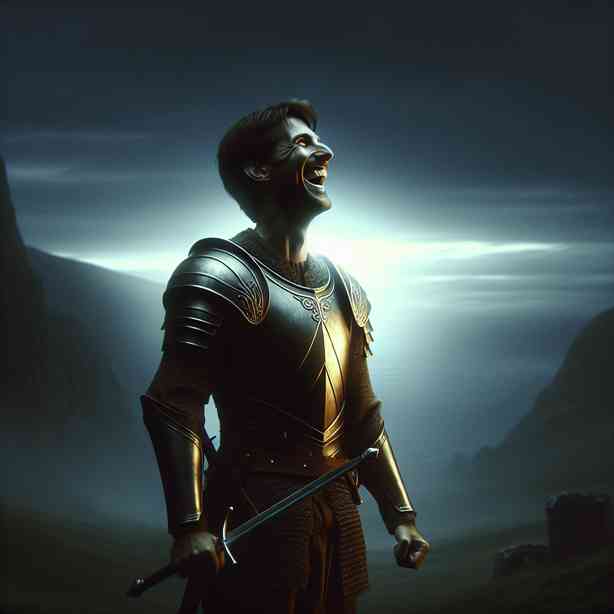
The phrase “When the Hero Laughs Alone” evokes a profound exploration into the complexities of heroism, solitude, and the multifaceted nature of human emotions. Throughout history, storytelling has presented heroes in a variety of ways, often highlighting their struggles, triumphs, and the profound sense of duty they carry. However, what happens when these heroes find themselves laughing alone? This question invites a deeper understanding of their inner worlds, the burdens they carry, and the societal expectations placed upon them.
When we think of a hero, we often envision someone who possesses extraordinary abilities or qualities that set them apart from the average person. These figures are typically depicted as strong, courageous, and capable of overcoming seemingly insurmountable challenges. Yet, beneath their powerful exterior lies a rich tapestry of emotions and experiences that may not always align with the heroic image projected to the world.
The laughter of a hero can symbolize a multitude of emotions. It can express joy, relief, or even a moment of respite from their relentless struggles. However, it can also signify a deeper sense of isolation or melancholy. This duality invites us to consider the internal conflicts that heroes may experience, often hidden from the gaze of society. In moments of solitude, when the world falls silent around them, the hero may find themselves at a crossroads of self-reflection, contemplating their journey and the sacrifices made along the way.
This examination of solitude becomes particularly poignant when we consider the role of society in shaping our perceptions of heroism. In many cultures, heroes are celebrated figures, revered for their accomplishments and often expected to adhere to an elevated standard of behavior. This societal pressure can become an isolating force, as the hero may feel compelled to uphold a façade that conceals their vulnerabilities. Consequently, their moments of laughter may serve as a coping mechanism, a temporary escape from the weight of those expectations.
Laughter, in its essence, is a powerful tool for connection and healing. It transcends cultural barriers and can create moments of shared joy, even in the darkest of times. Yet, when a hero laughs alone, it raises questions about the authenticity of their happiness. Are they laughing out of genuine joy, or is it a hollow echo of what they wish to feel? This concept underscores the importance of authentic connections in our lives, something that can often be overlooked in the pursuit of greatness.
Moreover, the idea of a hero laughing alone allows us to examine the narratives surrounding vulnerability. In contemporary society, there is a growing recognition of the importance of mental health and emotional well-being. The stigma surrounding vulnerability is slowly being challenged, yet many heroes—real or fictional—still struggle to express their true selves. The solitary laughter of a hero can symbolize a moment of realization that they are not alone in their experiences. It serves as a reminder that even the strongest among us experience moments of doubt, insecurity, and joy that are often unshared.
As we delve deeper into this theme, we can draw parallels to various literary and cinematic examples. Characters such as Batman, who operates under the shadows of Gotham, often exhibit traits of solitude despite their heroism. The moments in which they find humor or joy are seldom shared with others, creating a poignant contrast to their superhero identity. This narrative device effectively showcases the internal battles faced by those who are tasked with the responsibility of saving others while grappling with their own demons.
Additionally, the concept of a hero laughing alone can also be seen in literature through figures who embody a tragic hero archetype. These characters often experience a fall from grace or face insurmountable odds, leading to moments of laughter that are laced with irony. It is in these instances that we explore the juxtaposition between the hero’s outward demeanor and their internal struggles. The laughter may be a defense mechanism against despair, a way to cope with the overwhelming burden of expectations.
The theme of solitude also invites us to reflect on our own lives and the heroes we admire. How often do we project an image of strength and invulnerability, even when we feel a profound sense of isolation? It serves as a reminder of the importance of vulnerability in fostering genuine connections. By allowing ourselves to share our struggles and triumphs with others, we create space for empathy and understanding, ultimately breaking down the walls that isolate us.
In conclusion, the notion of “When the Hero Laughs Alone” serves as a profound reminder of the complexities of heroism, the importance of emotional authenticity, and the significance of shared human experiences. Heroes, whether real or fictional, are often depicted as paragons of strength, yet their laughter can reveal the intricate layers of their humanity. By acknowledging the solitude they may encounter, we foster a deeper appreciation for the struggles they endure and the moments of joy they experience in spite of those challenges. Ultimately, this exploration encourages us all to reflect on our own moments of solitude and the importance of connecting with others in our shared journey through life.


